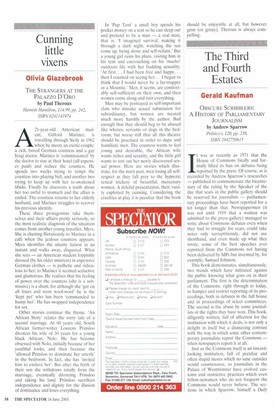Cunning little vixens
Olivia Glazebrook
THE STRANGERS AT THE PALAZZO D'ORO by Paul Theroux Hamish Hamilton, £14.99, pp. 242, ISBN 0291141974 A21-year-old American student, Gilford Mariner, is travelling through Sicily in 1962 when he meets an exotic couple: a rich, bored German countess and a gay Iraqi doctor. Mariner is 'commissioned' by the doctor to stay at their hotel (all expenses paid) and seduce the countess. He spends two weeks trying to tempt the countess into playing ball, and another two trying to keep up with her re-awakened libido. Finally he discovers a truth about her too awful to stomach and the affair is ended. The countess returns to her elderly husband, and Mariner struggles to recover his previous identity.
These three protagonists take themselves and their affairs pretty seriously, so the most realistic diagnosis of the situation comes from another young traveller, Myra. She is chatting flirtatiously to Mariner in a cafe when the jealous countess appears. Myra identifies the smutty liaison in an instant and walks away, disgusted. What she sees — an American student foppishly dressed (by his older mistress) in expensive German clothes — is pathetic and ridiculous to her; to Mariner it seemed seductive and glamorous. He realises that his feeling of power over the countess (she is a submissive) is a sham, for although she 'got on all fours and went woof-woof' he is the 'kept pet' who has been 'commanded to hump her'. He has swapped independence for sex.
Other stories continue the theme. 'An African Story' relates the sorry tale of a second marriage. At 60 years old, South African farmer-writer Lourens Prinsloo divorces his wife of 34 years for a young black African, Nolo. He has become obsessed with Nolo, initially because of her youthful looks, and then because she 'allowed Prinsloo to dominate her utterly' in the bedroom. In fact, she has 'invited him to enslave her'. But after the birth of their son she withdraws totally from the marriage, eventually divorcing Prinsloo and taking his land. Prinsloo sacrifices independence and dignity for the illusion of dominance and loses everything,
In 'Pup Tent' a small boy spends his pocket money on a tent so he can sleep out and pretend to be a man — a real man, that is: 'I imagined survival, making it through a dark night, watching the sun come up, being alone and self-reliant.' But a young girl ruins his plans, visiting him in his tent and encroaching on his 'macho' outdoors life with her budding sexuality. 'At first. . . I had been free and happy. then I counted on seeing her. .. I began to think that I would never be a fur-trapper or a Mountie.' Men, it seems, are comfortably self-sufficient on their own, and then women come along and ruin everything.
Men may be portrayed as self-important clots who mistake sexual submission for subordinancy, but women are treated much more harshly by the author. Bad enough that they should beg to be abused like whores, servants or dogs in the bedroom, but worse still that all this theatre should be practised in order to dupe and humiliate men. The countess wants to feel young and desirable, the African wife wants riches and security, and the little girl wants to test out her newly discovered sexual power. Here are stories which illustrate, for the main part, men losing all selfrespect as they fall prey to the hypnotic sexual trickery of beautiful, mercenary women. A doleful presentation, then: vanity exploited by cunning. Considering the cruelties at play it is peculiar that the book should be enjoyable at all, but however grim (or grimy), Theroux is always compelling.


































































































 Previous page
Previous page